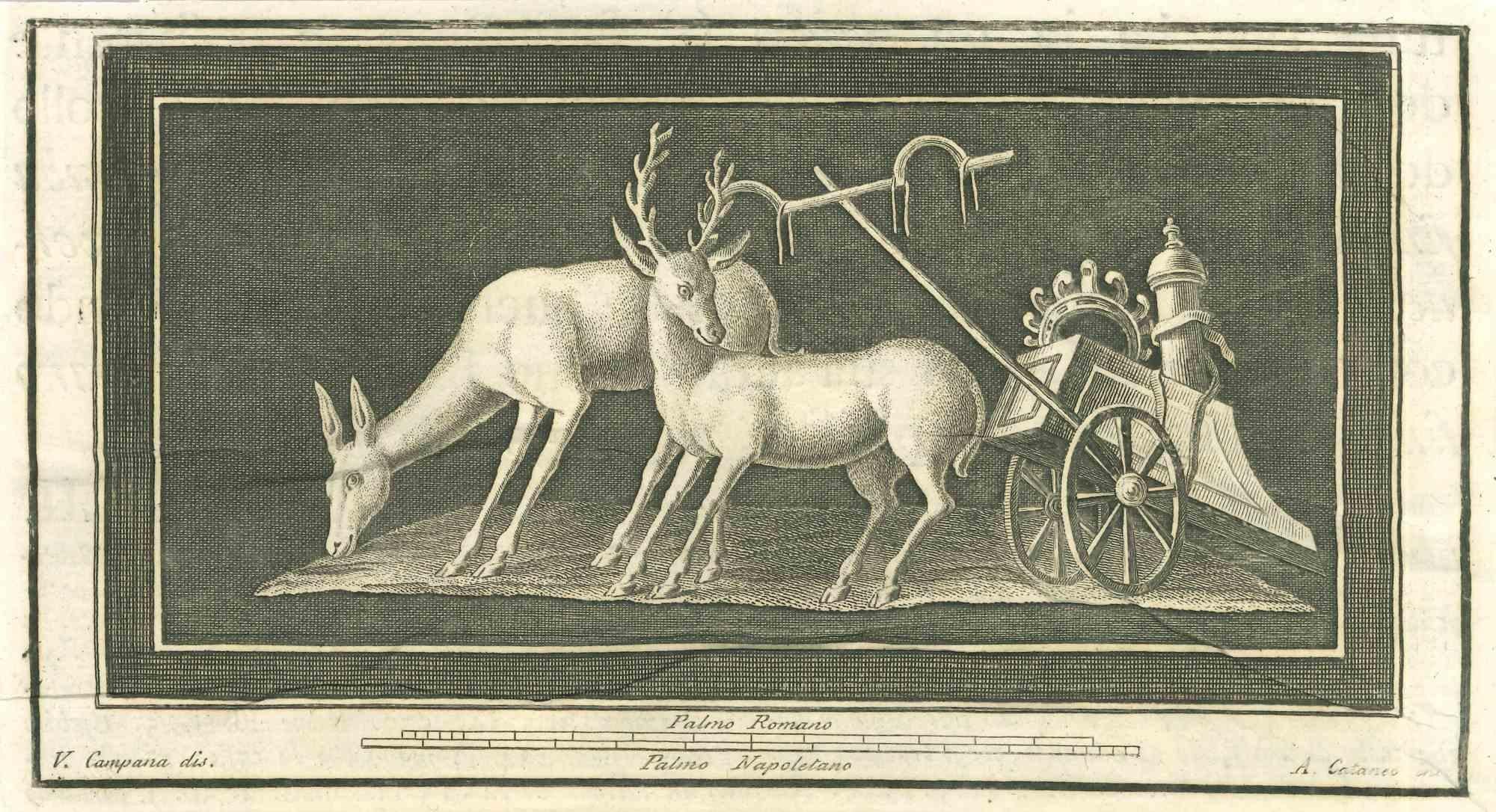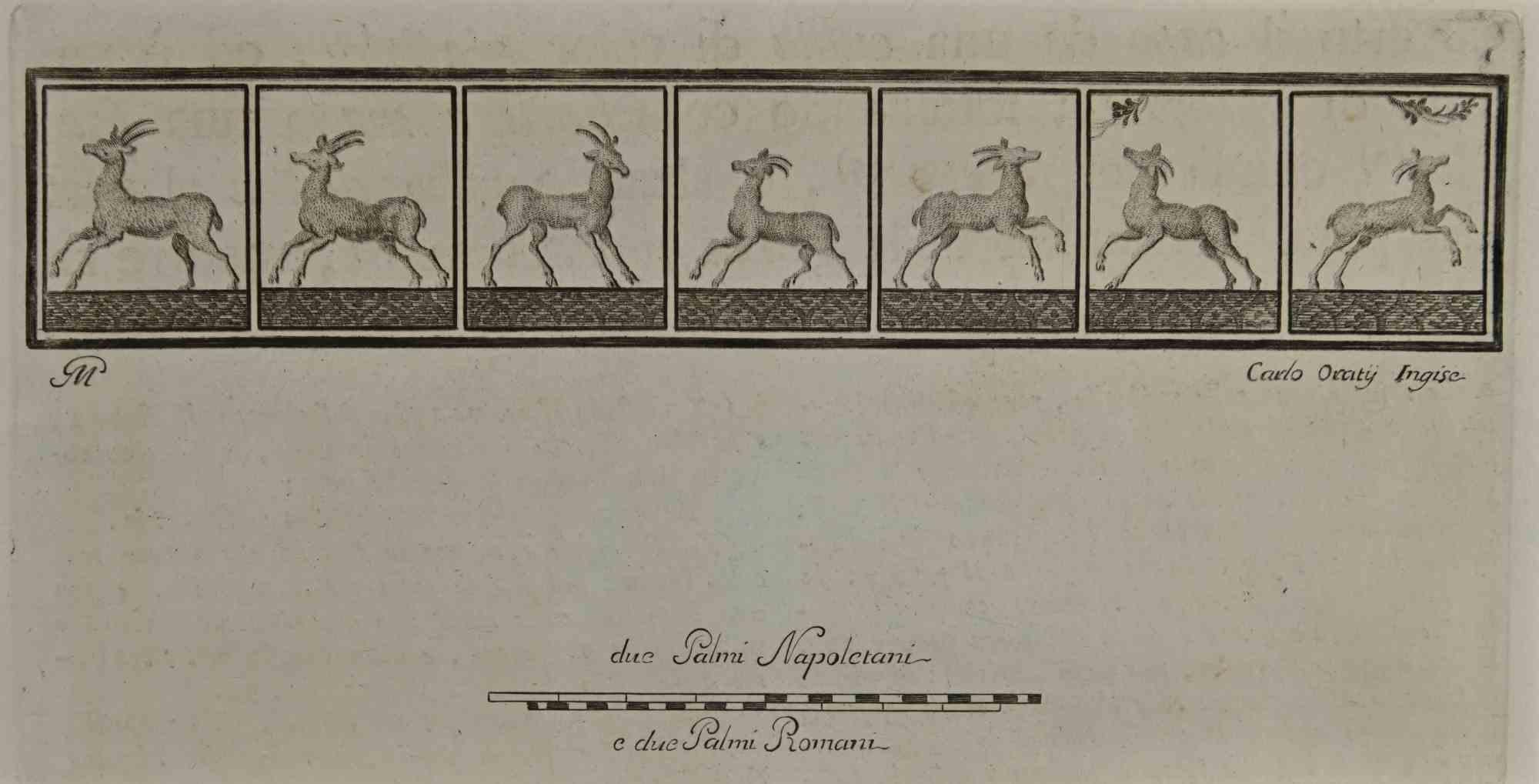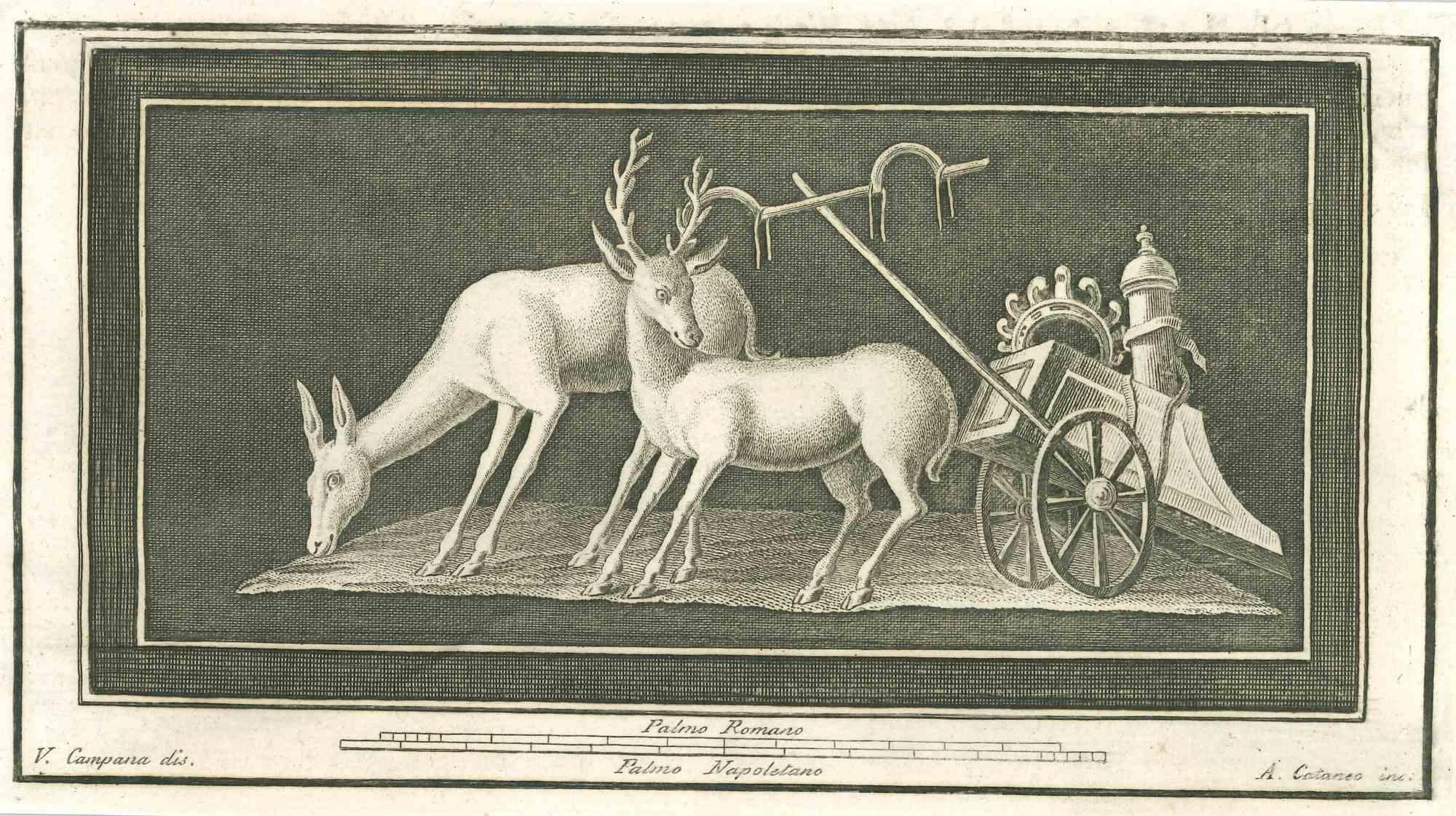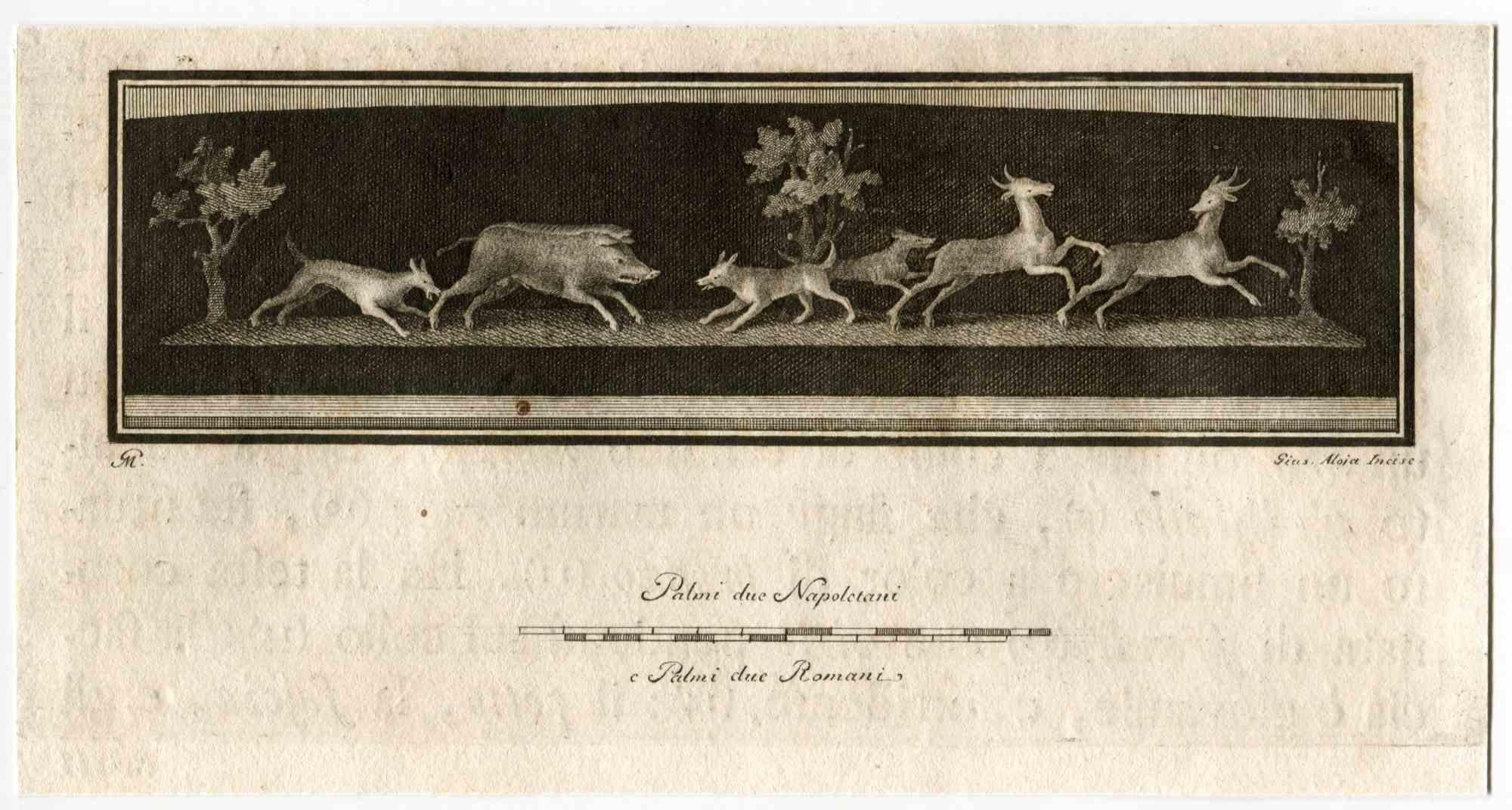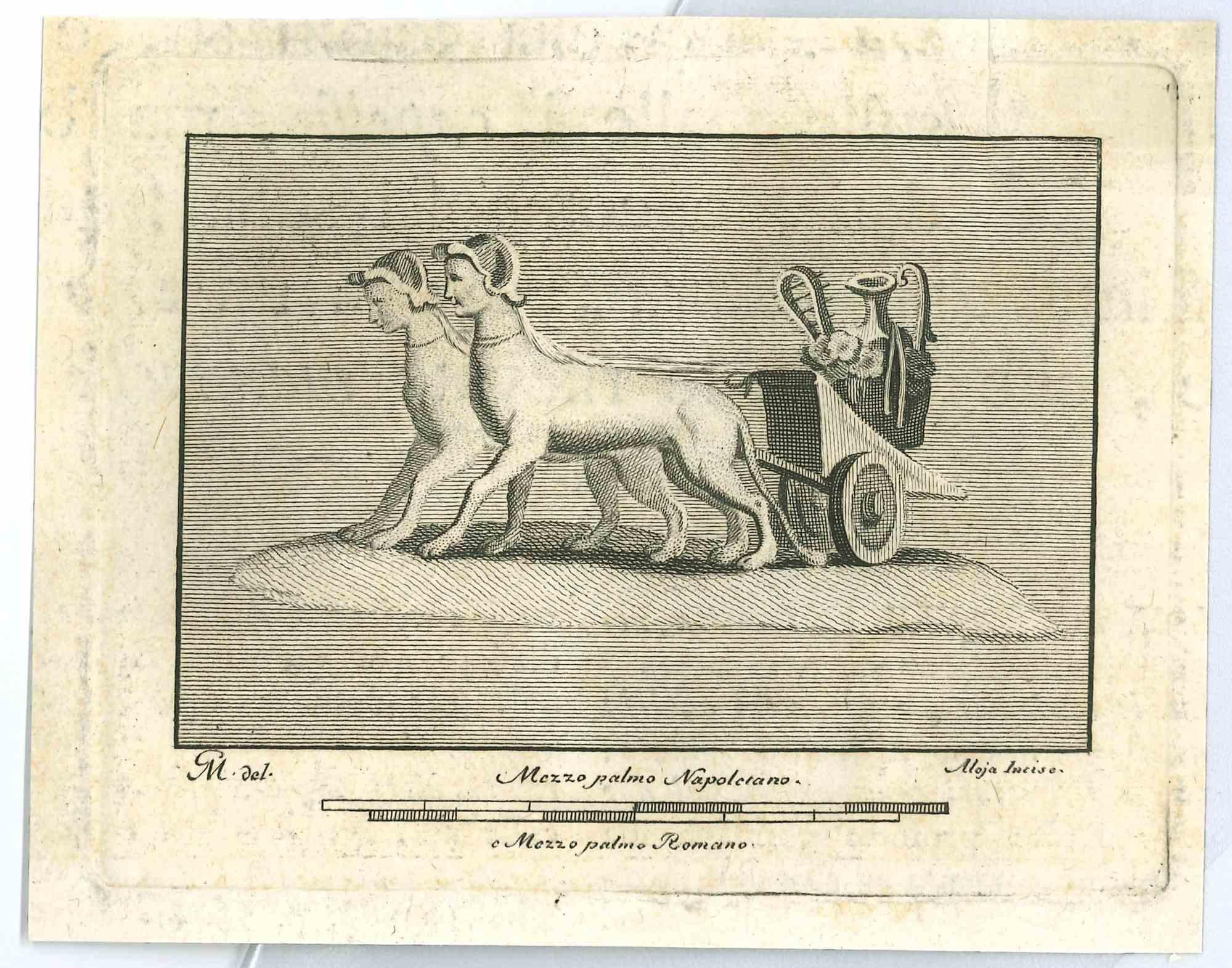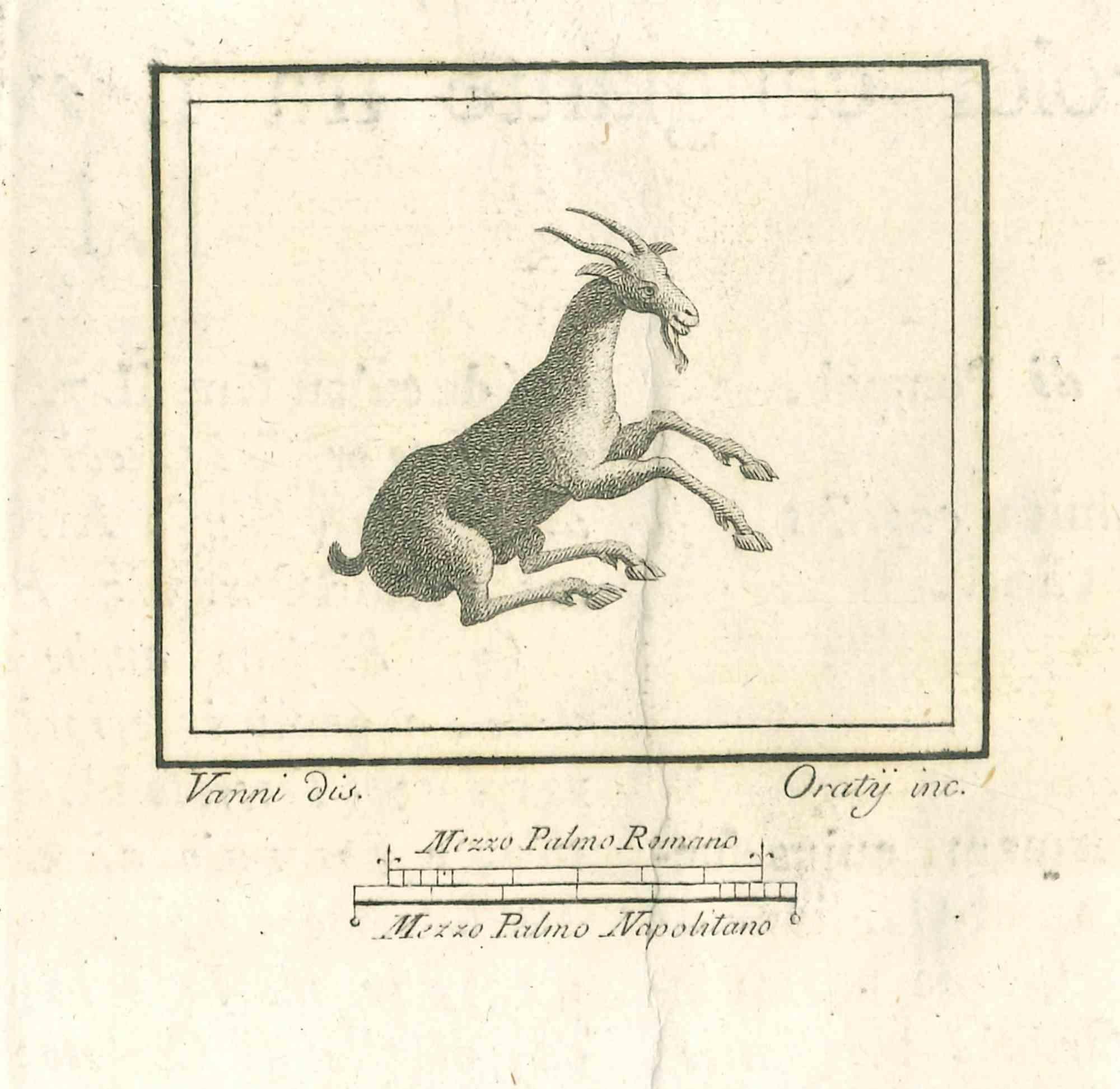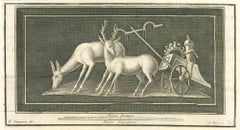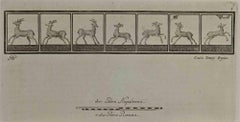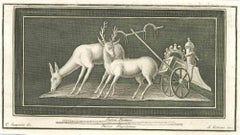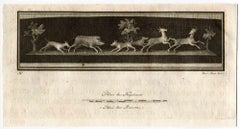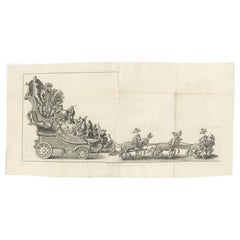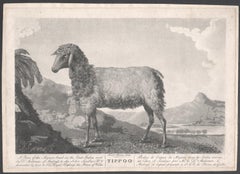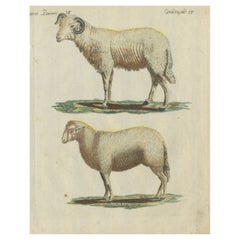Items Similar to Ram-Cart Fresco - Etching by Carlo Oraty - 18th Century
Want more images or videos?
Request additional images or videos from the seller
1 of 2
Carlo OratyRam-Cart Fresco - Etching by Carlo Oraty - 18th CenturyLate 18th Century
Late 18th Century
$299.18
£222.24
€250
CA$412.73
A$453.71
CHF 238.45
MX$5,509.67
NOK 2,974.58
SEK 2,818.21
DKK 1,903.13
About the Item
Ram-Cart Fresco from "Antiquities of Herculaneum" is an etching on paper realized by Carlo Oraty in the 18th Century.
Signed on the plate.
Good conditions with some folding.
The etching belongs to the print suite “Antiquities of Herculaneum Exposed” (original title: “Le Antichità di Ercolano Esposte”), an eight-volume volume of engravings of the finds from the excavation of the ruins of Herculaneum in the Kingdom of Naples (now Campania, Italy).
It was published between 1757 and 1792 by the Regia Stamperia, and copies were delivered to selected recipients across Europe.
Despite the title, the Antiquity of Herculaneum shows objects from all the excavations undertaken by the Bourbons in the Gulf of Naples. These include Pompeii, Stabia and two sites of Herculaneum: Resina and Portici.
The Bourbon King Carlo appointed fifteen scholars creating a new “Herculaneum Academy” to study the artifacts and publish the results of the archaeological excavations of the sites.
The engravings are of high quality and the accompanying text shows a large scholarship.
They were realized by 25 prominent artists involved by the King to prepare drawings and engravings on the finds, among which we can find Giovanni Elia Morghen, Carlo Nolli, Luigi Vanvitelli, and Giovanni Battista Casanova.
The “Antiquities” was designed more to amaze readers with the quality of the objects in the collection of the King of Naples than to be used in research., following and increasing the interest of 18th-century society for the classical culture and Art in particular.
Through the exaltation of the classical concept of proportions and harmony, the book was of inspiration to the neoclassical movement in Europe, giving artists and decorators access to a huge shop of Hellenistic motifs.
- Creator:Carlo Oraty
- Creation Year:Late 18th Century
- Dimensions:Height: 4.73 in (12 cm)Width: 9.06 in (23 cm)Depth: 0.04 in (1 mm)
- Medium:
- Movement & Style:
- Period:
- Framing:Framing Options Available
- Condition:Insurance may be requested by customers as additional service, contact us for more information.
- Gallery Location:Roma, IT
- Reference Number:Seller: T-1369341stDibs: LU650311586872
About the Seller
4.9
Platinum Seller
Premium sellers with a 4.7+ rating and 24-hour response times
1stDibs seller since 2017
7,709 sales on 1stDibs
Typical response time: 2 hours
- ShippingRetrieving quote...Shipping from: Grasse, France
- Return Policy
Authenticity Guarantee
In the unlikely event there’s an issue with an item’s authenticity, contact us within 1 year for a full refund. DetailsMoney-Back Guarantee
If your item is not as described, is damaged in transit, or does not arrive, contact us within 7 days for a full refund. Details24-Hour Cancellation
You have a 24-hour grace period in which to reconsider your purchase, with no questions asked.Vetted Professional Sellers
Our world-class sellers must adhere to strict standards for service and quality, maintaining the integrity of our listings.Price-Match Guarantee
If you find that a seller listed the same item for a lower price elsewhere, we’ll match it.Trusted Global Delivery
Our best-in-class carrier network provides specialized shipping options worldwide, including custom delivery.More From This Seller
View AllAnimals Pompeian Fresco - Etching by Aniello Cataneo - 18th Century
Located in Roma, IT
Animals Pompeian Fresco from "Antiquities of Herculaneum" is an etching on paper realized by Aniello Cataneo in the 18th Century.
Signed on the plate.
Good conditions.
The etching...
Category
18th Century Old Masters Figurative Prints
Materials
Etching
Ancient Roman Fresco Herculaneum - Etching by Carlo Oratij - 18th Century
Located in Roma, IT
Ancient Roman Fresco from the series "Antiquities of Herculaneum", is an etching on paper realized by Carlo Ortij in the 18th Century.
Signed on the plate.
Good conditions except f...
Category
Late 18th Century Old Masters Figurative Prints
Materials
Etching
Animals Pompeian Fresco - Etching by Aniello Cataneo - 18th Century
Located in Roma, IT
Animals Pompeian Fresco from "Antiquities of Herculaneum" is an etching on paper realized by Aniello Cataneo in the 18th Century.
Signed on the plate.
Good conditions.
The etching...
Category
18th Century Old Masters Figurative Prints
Materials
Etching
Ancient Roman Fresco - Etching by Vincenzo Aloja - 18th Century
By Vincenzo Aloja
Located in Roma, IT
Ancient Roman Fresco, from the series "Antiquities of Herculaneum", is an original etching on paper realized by Vincenzo Aloja in the 18th century.
Signed on the plate on the lower ...
Category
18th Century Modern Figurative Prints
Materials
Etching
Ancient Roman Fresco - Original Etching by Vincenzo Aloja - 18th Century
By Vincenzo Aloja
Located in Roma, IT
Ancient Roman Fresco, from the series "Antiquities of Herculaneum", is an original etching on paper realized from a design by Vincenzo Aloja in the 18th century.
Signed on the plate...
Category
18th Century Modern Figurative Prints
Materials
Etching
Roman Fresco - Etching by Carlo Oraty - 18th Century
Located in Roma, IT
Roman Fresco from "Antiquities of Herculaneum" is an etching on paper realized by Carlo Oraty in the 18th Century.
Signed on the plate.
Good conditions.
The etching belongs to the...
Category
Late 18th Century Old Masters Figurative Prints
Materials
Etching
You May Also Like
Rare Antique Religious Engraving of a Horse Drawn Float, 1775
Located in Langweer, NL
Antique print of a horse drawn float with religious figures. Double page with joined sheets and original folding lines. This print originates from 'Prael-treyn [...] toegeschikt aen ...
Category
Antique 18th Century Prints
Materials
Paper
$689 Sale Price
20% Off
Le Mouton de Barbarie, antique French 1760s sheep engraving
Located in Melbourne, Victoria
'Le Mouton de Barbarie'
Copper-line engraving, circa 1765
From Buffon's "Histoire Naturelle, Generale et Particuliere Avec la Description du Cabinet du Roi" which was published in Paris.
Jacques E. De Seve...
Category
Late 19th Century Victorian Animal Prints
Materials
Engraving
Tippoo, antique India sheep aquatint engraving, circa 1780
Located in Melbourne, Victoria
‘Tippoo - A Ram of the Mysore breed in the East Indies, sent by Dr. Anderson of Madrass to Sir John Sinclair, Bt & presented by him to His Royal Highness...
Category
19th Century Victorian Animal Prints
Materials
Aquatint
Patina Rich Hand Colored Antique Print of a Sheep and Ram, circa 1820
Located in Langweer, NL
Original antique print of a sheep and ram. This engraved print originates from a very rare unknown Dutch work. The plates are similar to the plates in the famous German work: ‘Bilder...
Category
Antique Mid-19th Century Prints
Materials
Paper
$153 Sale Price
20% Off
Free Shipping
La Brebis, antique French 1760s sheep engraving
Located in Melbourne, Victoria
'La Brebis'
Copper-line engraving, circa 1765
From Buffon's "Histoire Naturelle, Generale et Particuliere Avec la Description du Cabinet du Roi" which was published in Paris.
24c...
Category
Late 19th Century Victorian Animal Prints
Materials
Engraving
European Pastoral Scene on Vellum. Probably Eighteenth Century
Located in Philadelphia, PA
Unknown
(European, probably Eighteenth Century)
Shepherds and Peasants in a Landscape
Ink, watercolor, and gouache on vellum; 12 5/8 x 19 3/8 inches
Framed: 20 x 28 inches (approx.)
Category
18th Century Old Masters Landscape Drawings and Watercolors
Materials
Ink, Watercolor, Gouache, Vellum
More Ways To Browse
Barbizon Etchings
Chagall Flowers
Chagall Galerie Maeght
Chagall Lithograph Ruth Boaz
Chagall Ruth And Boaz
Circus Ring
Crepax Valentina
David Hockney Brothers Grimm
De Chirico Poster
Deux Femmes Picasso
Edyta Grzyb
Erotic Illustration
Erte Signed Serigraph
Fernandez Arman Violin
Gauguin Lithographs
Greek Vase Engraving
Greg Singley
Hamilton Greek Prints
